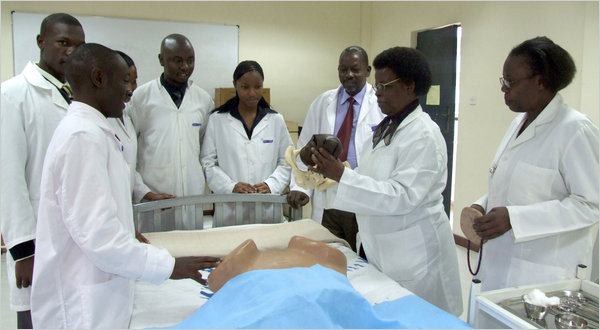
The United States will invest $130 million over the next five years to transform African medical education and increase the number of health care workers on the continent, the U.S. Department of Health and Human Services announced October 7.
In partnership with the U.S. President’s Emergency Plan for AIDS Relief (PEPFAR), the department is awarding grants to African institutions in a dozen countries under its Medical Education Partnership Initiative (MEPI), which works with U.S. medical schools and universities to form a network that includes about 30 regional partners, country health and education ministries, and more than 20 U.S. collaborators.
Grant recipients include the University of Botswana, Addis Ababa University in Ethiopia, Kwame Nkrumah University of Science and Technology in Ghana, the University of Nairobi in Kenya, the University of Malawi College of Medicine, Universidade Eduardo Mondlane in Mozambique, the University of Ibadan in Nigeria, the University of KwaZulu-Natal and Stellenbosch University in South Africa, Kilimanjaro Christian Medical Centre in Tanzania, Makerere University in Uganda, the University of Zambia and the University of Zimbabwe.
The program is designed to support PEPFAR’s goals to train and retain 140,000 new health care workers and improve the capacity of partner countries to deliver primary health care.
“We must dramatically transform African medical education to increase the number of qualified care providers available and develop the scientific expertise needed for research and innovation,” said Ambassador Eric Goosby, U.S. global AIDS coordinator at the Department of State. “By engaging country health and education ministries, MEPI will strengthen national plans to improve medical instruction and bolster the overall health care delivery systems. As we transition PEPFAR-supported HIV efforts from an emergency response to a more sustainable effort, we need to develop the expertise necessary for evidence-based decision-making on the local level. This expertise will empower countries to lead health programs and fulfill their responsibility for the health of their people.”
Several components of the National Institutes of Health (NIH) joined PEPFAR in funding the initiative, which will be administered by Fogarty International Center of the NIH and the HIV/AIDS Bureau of the Health Resources and Services Administration.
“Noncommunicable diseases, such as maternal-child health issues, cardiovascular disease, cancer and mental illness, represent the fastest-growing causes of morbidity and mortality in sub-Saharan Africa,” said NIH Director Francis Collins. “We at NIH are delighted to join hands with our colleagues in PEPFAR to help build research and clinical capacity in these important areas of human health.”
Eleven programmatic awards, largely funded by PEPFAR, will expand and enhance medical education and research training in the field of HIV/AIDS, while eight smaller non-HIV/AIDS awards, funded by NIH, will encourage the development of expertise in topics such as maternal and child health, cardiovascular diseases, cancer, mental health, surgery and emergency medicine.
Over a five-year period, MEPI intends to provide up to $10 million for each programmatic award, up to $2.5 million for each linked project and up to $1.25 million for each pilot grant.
A coordinating center is being established to link the African sites and their U.S. partners, allowing them to share resources and technical expertise. In addition, a Web-based platform will be developed to allow all partners to share data and outcomes.
That platform will enable participating institutions to strengthen their information technology infrastructure, support distance education and data sharing, and encourage the establishment of clinical registries to inform research and health care decision-making on national levels. The coordinating center also will form an African leadership network to guide and advocate for the initiative, according to NIH.
A complete list of awards and collaborating partners is available on the NIH website.






